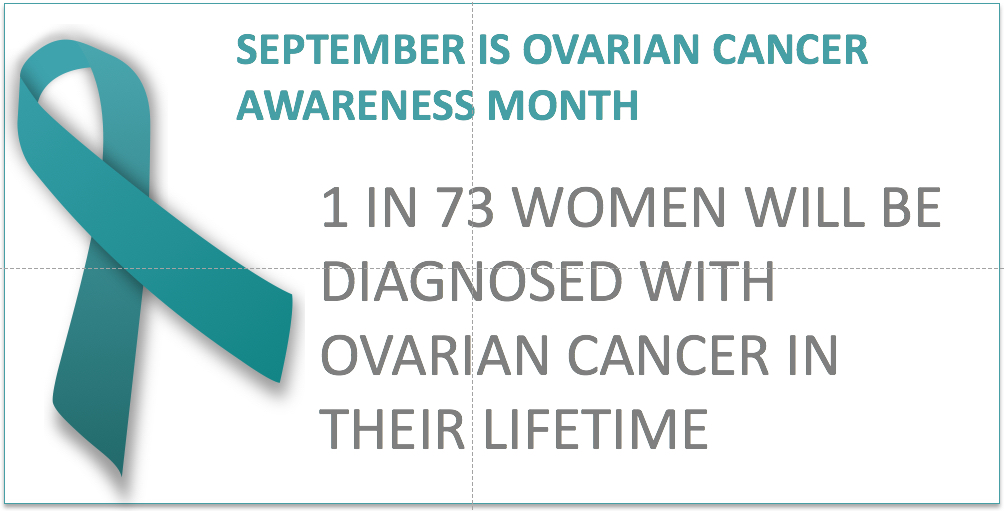Ovarian cancer used to be known as the “silent killer” because its symptoms closely mimicked those of other conditions, and all too often the cancer wasn’t officially diagnosed until tumor growth had already spread beyond the ovaries. Recent advancements in research leading to better detection and diagnosis has allowed more women to seek treatment in the early stages of ovarian cancer and increase their chances of survival. Women diagnosed in the early stages often can expect a five-year survival rate of nearly 93 percent, according to the Mayo Clinic website.
Symptoms of ovarian cancer can be hard to pinpoint, so the key is if symptoms occur persistently (daily, for a few weeks), it may be a good idea to get it checked out:
• Abdominal pressure or fullness
• Urinary urgency, or unexplained changes in bowel habits
• Pelvic discomfort
• Low back pain
• Changes in menstruation
• Pain during intercourse
If you suspect you may have ovarian cancer, it is important to discuss it with your doctor to assure early detection and treatment. Some questions you may want to ask are:
- What kind of tests do I need? There currently isn’t a screening test to detect ovarian cancer. If suspected, your doctor may perform what’s called a Cancer Antigen (CA)-125, or if it is known that a tumor is present, the doctor may perform an OVA1 test to determine if cancer is present. The doctor will also perform a pelvic exam, and transvaginal ultrasound to form a complete opinion of the reproductive organ's status.
- What type of ovarian cancer do I have? The disease develops in one of three ovarian sources:
• the lining of the ovaries - epithelium, causing epithelial tumors
• the egg-producing cells of the ovaries - germ cell tumors
• the estrogen and progesterone-producing tissues that hold the ovaries together - stromal tumors
- What type of treatments are available, and what kind of side effects can I expect? Options for treatment your doctor may consider depending on your particular case could include surgery, radiation therapy, chemotherapy, and intraperitoneal therapy. Side effects can include hair loss, nausea, vomiting, "chemobrain", and abdominal pain.
- If I still want to have children, what options are available? If you are of childbearing age, and your cancer is detected early enough, your doctor may be able to remove only the affected ovary leaving the other ovary to continue to produce eggs.
- Will I have to stop working? Some treatments may require you to take time off work. You may need to discuss this with your employer when the whole picture of your condition and treatment is determined.
- I have these other health conditions. How can I best manage them together? If you have other health conditions, you will need to discuss with your doctor options particular to your case.
- Are there any restrictions I need to follow? Throughout the course of treatment, you may not feel well. Now, more than ever, it will be important to eat well and try to manage your stress. Protein-rich food may help you feel better quicker because of their ability to build and repair body tissue. You may want to pack in the calories with whatever you eat since you may not be eating much. Bear in mind that while you may have an aversion to something this week, next week your opinion may change, so try and keep an open mind.
- Should I see a specialist? What will that cost, and will my insurance cover seeing a specialist? Should I get a second opinion? Be your own best advocate! If you want a second opinion, ask for one. Many doctors welcome a second opinion contrary to what you might think. Many insurance companies may cover additional testing performed by a different doctor if your doctor requests it. Some insurance companies even require a second opinion. The short delay taken in getting all the information to allow you to feel more confident and in control of your health in most cases will not be detrimental to your treatment.
- Is there any research I can do on my own and what sources would you recommend?
A cancer diagnosis can be scary, frustrating, and depressing. Your doctor can suggest their favorite reputable web sites and support groups for obtaining more information and helping you cope with ovarian cancer.
This information is not meant to be a replacement for talking with your doctor. Talk with your team of doctors to get the full picture for your particular case.
Resources:
www.mayoclinic.com Ovarian Cancer
www.ovariancancer.org About Ovarian Cancer
Do you have a question about cancer? Check out EmpowHER’s cancer page. Sign-up, post a question, share your story, connect with other women in our community and feel EmpowHERed!
Christine Jeffries is a writer/editor for work and at heart, and lives in a home of testosterone with her husband and two sons. Christine is interested in women’s health and promoting strong women.


